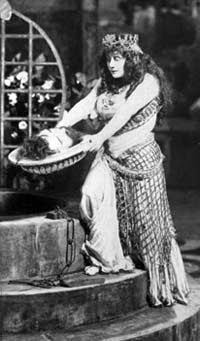 |
| Olive Fremstad, Salome of the Met's cancelled first production |
It's a funny thing about opera; 95% of the people who attend opera performances view it as high-class escapist entertainment. (I sense that this statistic is accurate. Gee, I'm very sensitive today!) The standard repertoire is popular because it's safe and familiar. A spunky girl and hilarious capers in Barber of Seville. Champagne and frolicking in Fledermaus. Pageantry and romance in Aida. Young love and a "pretty" death in Bohéme. Heroes you can root for, villains you can boo, and all swathed in melodies sweet and melodies lively.
Then there's Salome.
I was disappointed a few week ago. I had lined up a speaking engagement at a large church in Norfolk, with an audience of over 100. My topic: Salome. Perfect, right? An opera with roots in the New Testament for a church crowd.
Then my supervisor at Virginia Opera toIld me that one of the ministers on staff there had called to cancel. She had looked up the story, read the part about kissing the severed head of John the Baptist, and called to say "this material is not appropriate; we wanted something lighter and more entertaining."
It's amazing that, 107 years after its world premiere, this opera still has the power to shock and repulse conservative audiences. What does that say about society? Film and television have long since prospered by going to unpleasant places for the sake of telling compelling stories, but opera gets static when it attempts to follow suit.
 |
| Rudy Giuliani: how about a nice Aida? |
In 1907, the New York Times reported on the imminent debut of Salome. Following the final dress rehearsal, attended by numerous Manhattan big-wigs, readers were greeted by this headline:
TAKE OFF SALOME, SAY OPERA HOUSE DIRECTORS. PROTEST FORMALLY AGAINST A REPETITION OF THE OPERA. "The wealthy men who own the Metropolitan Opera House have put their ban on 'Salome'” (the article went on to say). "They have notified Herr Direktor Conried that they consider the opera objectionable and detrimental to the best interests of the opera house".
The Tribune's critic, in his review of the rehearsal, said that "(a critic) should be an embodied conscience stung into righteous fury by the moral stench with which "Salome" fills the nostrils of humanity..."
The Sun's reviewer pondered "the question of whether the causation of nausea should be regarded as a laudable purpose for dramatic and musical art".
And so, despite the fact that the cast and the orchestra had been rehearsing for months (Strauss's "crazy modern music" was difficult to master for artists of that generation), the production was cancelled by the Board of Directors. This, despite the triumphant reception given Salome throughout Europe. It would be several years before it returned.
By the way - none of the artists were paid for all those rehearsals, believe it or not. Orchestra and singers were paid for performances only. Yikes!
Now fast-forward all the way to 2014. The Metropolitan Opera, never much of a risk-taker through the 20th-century, plans the semi-bold step of staging Klinghoffer, a much-praised drama which has been playing for fully two dozen years in opera houses around the world. General Manager Peter Gelb has added it to the slate of Saturday radio broadcasts and HD cinema transmissions.
Of course, the how depicts unpleasantness. Palestinian terrorists commandeer a cruise ship filled with Jewish vacationers and throw a wheelchair-bound man, the titular Klinghoffer, overboard to his death.
So, this was a smashing success, right? I mean, c'mon - it's 2014. We're all accustomed to provocative, edgy, unpleasant drama. We're living in the post-Breaking Bad world.
Not so much. Here's what greeted Times readers just three month ago:
Protests Greet Metropolitan Opera’s
Premiere of ‘Klinghoffer’
At the Metropolitan Opera’s first performance
of John Adams’s “The Death of Klinghoffer” on Monday night, men and women in
evening attire walked through a maze of police barricades, while protesters
shouted “Shame!” and “Terror is not art!” One demonstrator held aloft a white
handkerchief splattered with red. Others, in wheelchairs set up for the
occasion, lined Columbus Avenue.
Political figures, including former Mayor
Rudolph W. Giuliani, joined a rally, several hundred strong at Lincoln Center,
to denounce an opera that has become the object of a charged debate about art,
anti-Semitism and politics.
And while the production was not cancelled, the radio and cinema broadcasts were axed, leaving opera lovers unfamiliar with the piece to decide for themselves whether it was art or not.
In another 107 years, it'll be 2122. Assuming the planet hasn't been destroyed, that New York city still exists, and that opera is still performed by then, I wonder if the attitudes of opera-goers will have evolved to the point of allowing music drama the same freedom of expression that has become routine in other genres.
Is it me, or is it only opera, among the arts, that remains ruled by the prim and prudish, unenlightened, reactionary, conservative sector of the public? I'm sure that yesterday's HD transmission of The Merry Widow was lapped up, with no complaints, like the sweet, sweet cream it is.
About 2122:

No comments:
Post a Comment
Note: Only a member of this blog may post a comment.